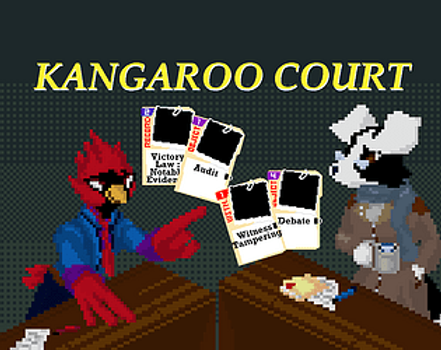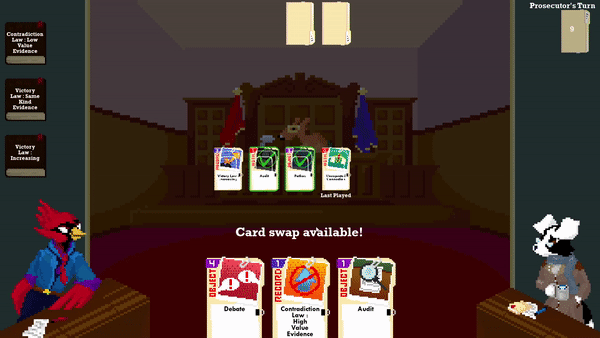Kangaroo Court

Kangaroo Court was a game I designed for the Texas Aggie Game Dev 2020 Game Jam with my partner, Will Fish. The game was awarded third place in the jam. I worked as a game designer, UI/UX designer, and pixel artist on this project. The game is an asymmetrical hidden information card game where the prosecution and defense take turns laying down evidence in a timeline to try and build their case. The prosecution is trying to build up a big enough mass of evidence to convict while the defense is trying to find enough contradictions in the prosecution's case for an acquittal. In true Ace Attorney fashion, the rules of the court room can change at any time, forcing players to adapt to the changing circumstances.
An Ever Changing Set of Rules

The TAGD 2020 Game Jam's theme was "Changing Perspectives," so my immediate first thought was to design a game where the rules can change on a whim. My vision was to design a game where players' perception of what's happening in the game could change at any moment. During the initial design phase my mind drifted towards the quickly changing nature of court cases found in the "Phoenix Wright" series, and I looked to see how I could adapt that sort of gameplay to a multiplayer environment. Specifically, I wanted to design a game where players could surprise their opponents in a "Gotcha" moment, similar to the dramatic reveals found in the Phoenix Wright games. For "Gotcha" moments to be possible, players can't know what evidence their opponent has before dramatically revealing their grand plan. For this reason, a hidden information card game was a natural fit. Additionally, court rooms in general have two sides looking to do two very different things. The defense is looking to absolve their client of wrongdoing, while the prosecution is looking to convict. This made asymmetrical gameplay an obvious choice for the card game.
Next came the actual mechanics of the game. Both players needed to have drastically different goals, but in a court room the facts need to be established before either side can make a compelling case. We decided to make the play field a chronological set of events to match this idea. Both players can play a card to enter evidence into one shared timeline, but each player is looking to manipulate the evidence to play towards their win conditions. Of course true to the name Kangaroo Court, the rules can change at any time. Every card has a secondary effect, and the most important of these effects is changing the rules of the game. When a law card is played, the rules that decide what combinations of evidence are considered valid for both players' win conditions change.
One of the keys to the design of the game is the fact secondary effects will always activate whenever a card is played whether it helps the player who played the card or not. I designed cards this way to force players to make tough decisions about the types of evidence they put into the timeline. Adding one piece of evidence to the timeline might work towards their current win condition but might also give their opponent an additional win condition to play towards. Players never truly know whether the decisions they're making truly work towards their own ends or if their opponent was one step ahead of them the entire time.
UI/UX Design

One of the reasons a game like Kangaroo Court works so well as a digital card game as opposed to a physical one is the visual clarity digital card games are able to provide. When there might be 3 different win or lose conditions active at any given time that are constantly changing, it's important to make sure the player is able to keep track of exactly what's working in their favor or to their detriment. As such, I designed the UI to dynamically signpost what cards are currently contradictions or which cards are working to the largest chain of viable evidence. Contradictions are marked by big red exclamation points, while cards in the chain that are working towards the defense's case are marked with a large green checkmark. Additionally, when either player is close to victory, the game uses a dynamic music change to make it clear to the opposing player that they need to do something, fast.
Lessons to Learn
Despite our best efforts, the game ran into some amount of feature creep as we were working on the project. If I had more time to work on it in the time frame, I think it would have been good to work on some of the things we had originally tried to put in the game. These include things like a tutorial, single player mode, and online play. I also think I learned a lot about balancing asymmetrical character abilities over the course of this project.
Where to play it?
Kangaroo Court can be found on itch.io here.
